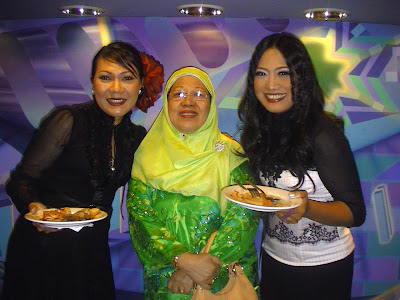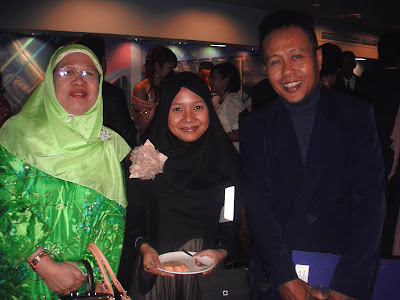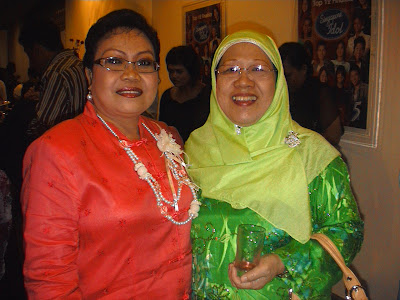One of the headlines of yesterday's BH caught my eye. There it goes again, the same issues...
'Ramai anak Melayu tidak hadiri prasekolah.'It was not just about having no money, but for some of these families, it seems that their circumstances are more dire - there are survival issues to think about rather than sending their children for preschool.
Issues like, 'where to sleep for the night?' and 'where to get the next meal?' and 'how am I going to pay for the next bill - utilities and medical.' It looks like they have pressing immediate concerns that they cannot even think about the long term.
So how can this group of people be helped? Or are these group of people simply cannot be bothered and therefore will be the ones falling through the cracks? Are the current assistance schemes really enough or useful or targetting the root of the problems?
For a tongue-in-cheek look at the plight of the Malays, a blogger at http://www.happeepill.com/cartoons/enjetsemut/enjet.htm takes a humorous jab on the plight of the Malays. On the positive side of things, the Malays have a masterplan - their plan is for the Hereafter. But lest I sounded negative, I don't think some of those in need even have any plans, this life or the next.
Maybe I don't know the scope of their problems and if the community self-help groups are really interested in getting this group out of this cycle, something greater than what we have now have to be done.
When a single mother of 33 years old with 5 kids with ages ranging from 6 years to 14 years old do not send her kids to preschool, we know somehow it was not an easy decision if she is aware of the importance of education. First, her life is not an easy one, having to care for 5 kids, with the little income that she makes as a stall helper. Let's forget that she will ever get any form of maintenance from her ex-husband for a while, what do we do then?
It may be easier said than done, and I don't know the family enough to tell them what they need. And I may sound idealistic. But let's say it's a hypothetical family with hypothetical situation as above.
There's Kifas (kindergarten financial assistance scheme) that will pay 75% of the kids preschool education. There's a school grant of $200 for each child from a low income family given out by the government. There's the school pocket money fund from SPH. And I'm sure there are many others.
Every cents count for the family.
Can Mendaki or AMP or the Education Trust Fund or any other groups pay for the balance 25% of the cost of preschool for their children? I know one thing for sure the self-help groups do not want these families to be too reliant and dependent on handouts, as giving them free is as good as giving it easy without working hard for it. Like they say, 'Give them a fish, and they will eat for a day. Teach them how to fish, and they can have fish for the rest of their lives.' However, if it is 100% subsidised, at least the burden of fees is taken away from them. First and foremost, why can't we adopt a socialist stance on preschool education? Why can't preschool education be free for all? If it cannot be free for all, why can't it be free for this group of people?
There are many self help groups that give free schoolbags, stationery and books. That's savings too. With such savings, perhaps these families can then spend the money on other forms of enrichment for their children or themselves. But like it was mentioned in the papers, it's not just about financial issues.
The mom needs to work. So who can look after her children's needs so that she can work properly and maybe earn higher if she can study while working as well?
Instead of preschool help, why not childcare or daycare help? I believe they needed a place where their child will be looked after for most parts of the day while they are at work. In childcare or daycare, at least these kids will learn more rather than putting them in a crash course before starting primary one. They will also be able to socialise with other children and these will help in getting them adapted to primary school, for most of these children are not only academically weak but they lack in social skills as well. Free childcare or daycare assistance scheme is perhaps what they really needed instead of a short term crash course in preschool. It will also help the working single mother to concentrate on her job and perhaps learn another skill to supplement her income.
Motivation and Mindset Change. This is so important. We need good speakers who is able to do homevisits who is able to convince these families of a better life. We need good families who are able to adopt these families and their kids when it comes to showing them the way of a better life with education, a positive mindset and a motivated spirit. We need role models (someone who has been there, someone who was in their shoes before) but managed to get out of it to tell them that it can be done.
We need in depth programmes not a crash course. Haven't we learn that kids do not learn much by cramming everything in a few weeks? It has to be ongoing, it has to be in depth, not the attitude of "we give it to you already so you should be making it on your own." The truth is they still can't.
If hypothetically you have 5 schoolgoing children, and if you are certain that your life will change for the better if your eldest has a university degree, then the mother has to slog for another 10 years before her eldest child of 14 years of age is able to graduate with a general degree. So she needs support for 10 years, ceteris paribus, as her children get older, and their schooling needs get more demanding.
10 years of support for 5 school-going children who will make it...that's a lot of money, time, programmes, tuition, motivation etc etc...that are needed. What the mom earn will go into their meals, their medicines, their clothings, their transport, their utilities, their little "enrichment" and savings for the future and rainy days. And $500,000 for all the programmes for needy Malays is really peanuts, if surely and truely we want to see just one success story. Maybe $500,000 is barely enough to support one family for 10 years before they can truly be on their own.








